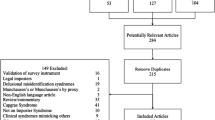Abstract
In light of diminishing resources in service settings, and the subsequent high risk for worker burnout, self care remains an important vehicle for promoting worker well-being. However, traditional definitions of self care are based in formulations about the nature of the self that don’t reflect paradigmatic shifts in social work practice that place increased emphasis on the multiplicity of workers’ selves, use of self and a collaborative frame for the worker–client relationship. Thus, a reconsidered definition of self care is proposed that reflects intersubjective, relational, and recovery-oriented frames for practice and posits strategies for self care that make the self appear.
Similar content being viewed by others
References
Arnd-Caddigan, M., & Pozzuto, R. (2008). Organizational prevention of vicarious trauma. Families in Society: The Journal of Contemporary Social Services, 36, 235–243.
Becker, D. (2013). One nation under stress: The trouble with stress as an idea. New York, NY: Oxford University Press.
Benjamin, J. (1998). Shadow of the other: Intersubjectivity and gender in psychoanalysis. New York, NY: Routledge.
Berzoff, J., & Kita, E. (2010). Compassion fatigue and countertransference: Two different concepts. Clinical Social Work Journal, 38, 341–349.
Bloom, S. (2013). The sanctuary model: A best-practices approach to organizational change. In V. L. Vandiver (Ed.), Best practices in community mental health: A pocket guide. Chicago, IL: Lyceum.
Burton, N. (2012). Getting personal: Thought on therapeutic action through the interplay of intimacy, affect and consciousness. Psychoanalytic Dialogues, 22, 662–678.
Chiller, P., & Crisp, B. R. (2012). Professional supervision: A workforce retention strategy for social work? Australian Social Work, 65(2), 232–242.
CSWE. (2008). Educational policy and accreditation standards. Washington, DC: CSWE.
CSWE. (2015). Educational policy and accreditation standards. Washington, DC: CSWE.
DeYoung, P. A. (2015). Relational psychotherapy: A primer. New York, NY: Routledge.
Figley, C. R. (2002). Compassion fatigue: Psychotherapists’ chronic lack of self care. JCLP/In Session: Psychotherapy in Practice, 58(11), 1433–1441.
Foucault, M. (1997). Michel Foucault: Ethics subjectivity and truth: The essential works of Foucault 1954–1984. New York, NY: The New Press.
Freudenberger, H. J. (1974). Staff burn-out. Journal of Social Issues, 30(1), 159–165.
Ganzer, C. (2007). The use of self from a relational perspective. Clinical Social Work Journal, 35, 117–123.
Ganzer, C., & Ornstein, E. D. (2004). Regression, self-disclosure, and the teach or treat dilemma: Implications of a relational approach for social work supervision. Clinical Social Work Journal, 32(4), 431–449.
Garran, A. M., & Werkmeister Rozas, L. (2013). Cultural competence revisited. Journal of Ethnic and Cultural Diversity in Social Work, 22(2), 97–111.
Ghent, E. (1990). Masochism, submission, surrender: Masochism as a perversion of surrender. Contemporary Psychoanalysis, 26, 108–136.
Heydt, M. J., & Sherman, N. E. (2005). Conscious use of self: Tuning the instrument of social work practice with cultural competence. The Journal of Baccalaureate Social Work, 10(2), 25–40.
Hunter, S. V., & Schofield, M. J. (2006). How counsellors cope with traumatized clients: Personal, professional, and organizational strategies. International Journal for the Advancement of Counselling, 28(2), 121–138.
Knight, C. (2012). Therapeutic use of self: Theoretical and evidence-based considerations for clinical practice and supervision. The Clinical Supervisor, 31, 1–24.
Lee, J. J., & Miller, S. E. (2013). A self-care framework for social workers: Building a strong foundation for practice. Families in Society: The Journal of Contemporary Social Services, 94(2), 96–103.
Maslach, C., Schaufeli, W. B., & Leiter, M. P. (2001). Job burnout. Annual Review of Psychology, 52, 397–422.
McTighe, J. P. (2011). Teaching the use of self through the process of clinical supervision. Clinical Social Work Journal, 39, 301–307.
Miehls, D., & Moffatt, K. (2000). Constructing social work identity based on the reflexive self. British Association of Social Workers, 30, 339–358.
Morse, G., Salyers, M. P., Rolli, A. L., Monroe-DeVita, M., & Pfahler, C. (2012). Burnout in mental health services: A review of the problem and it’s remediation. Administration, Policy, and Mental Health, 39, 341–352.
Newell, J. M., & Nelson-Gardell, D. (2014). A competency-based approach to reaching professional self-care: An ethical consideration for social work educators. Journal of Social Work Education, 50(3), 427–439.
Reupert, A. (2007). Social worker’s use of self. Clinical Social Work Journal, 35, 107–116.
Schaufeli, W. B., Leiter, M. P., & Maslach, C. (2009). Burnout: 35 years of research and practice. Career Development International, 14(3), 204–220.
Shulman, L. (2012). The skills of helping individuals, families, groups, and communities. Belmont, CA: Brooks/Cole.
Siebert, D. C. (2005). Personal and occupational factors in burnout among practicing social workers: Implications for research, practitioners, and managers. Journal of Social Service Research, 32(2), 25–44.
Skovholt, T. M., Grier, T. L., & Hanson, M. R. (2001). Career counseling for longevity: Self-care and burnout prevention strategies for counselor resilience. Journal of Career Development, 27(3), 167–176.
Stanhope, V., & Solomon, P. (2013). Recovery-oriented services. In V. L. Vandiver (Ed.), Best practice in community mental health (pp. 185–198). Chicago, IL: Lyceum.
Whitaker, T., Weismiller, T., & Clark, E. (2006). Assuring the sufficiency of a frontline workforce: A national study of licensed social workers. Washington, DC: National Association of Social Workers.
Author information
Authors and Affiliations
Corresponding author
Rights and permissions
About this article
Cite this article
Bressi, S.K., Vaden, E.R. Reconsidering Self Care. Clin Soc Work J 45, 33–38 (2017). https://doi.org/10.1007/s10615-016-0575-4
Published:
Issue Date:
DOI: https://doi.org/10.1007/s10615-016-0575-4




